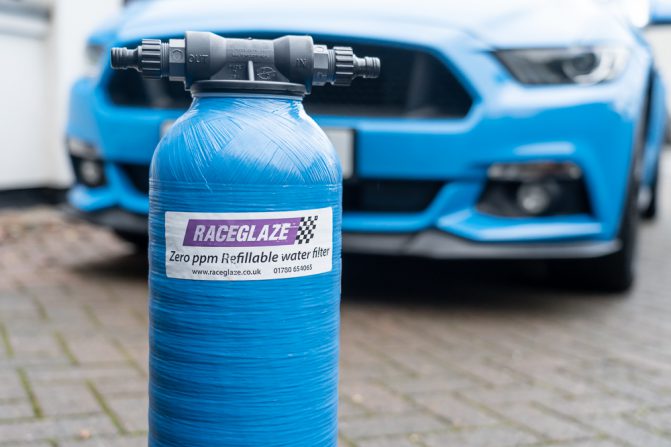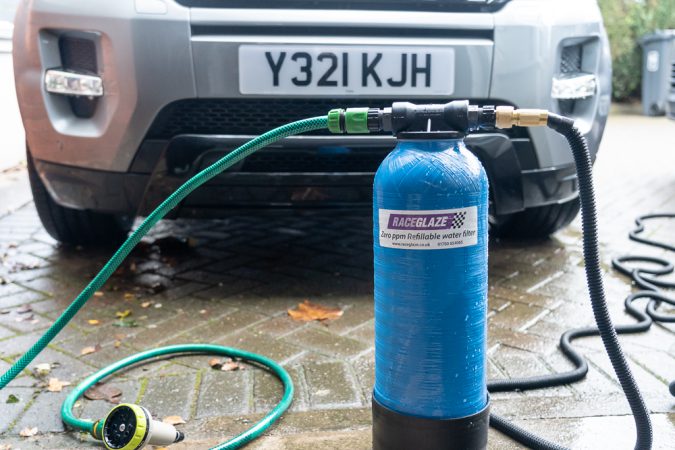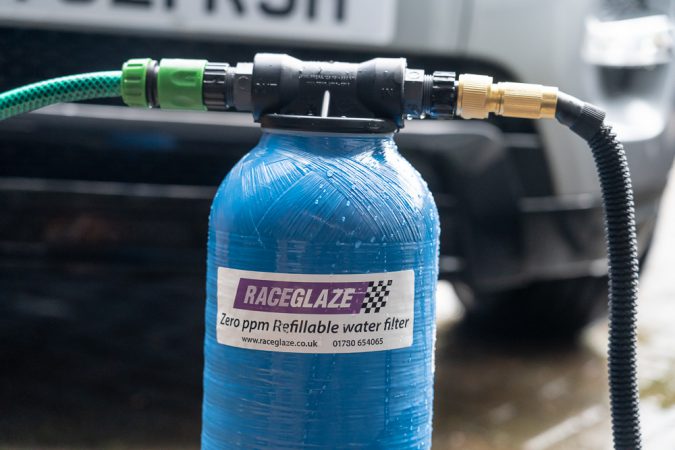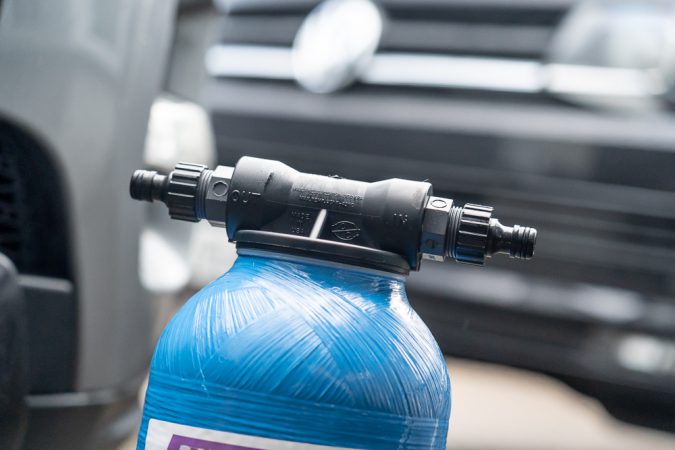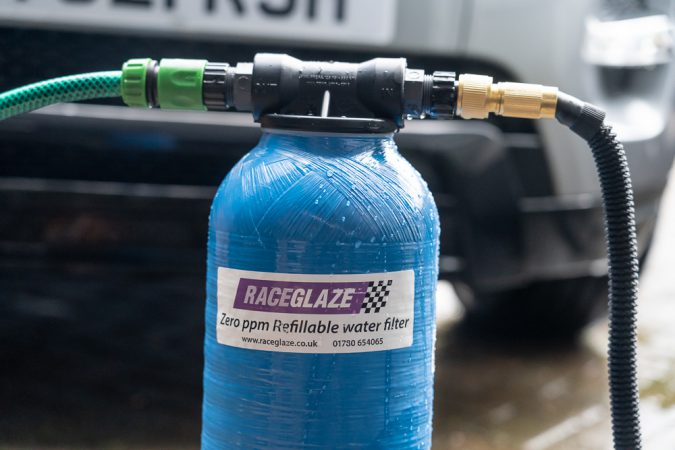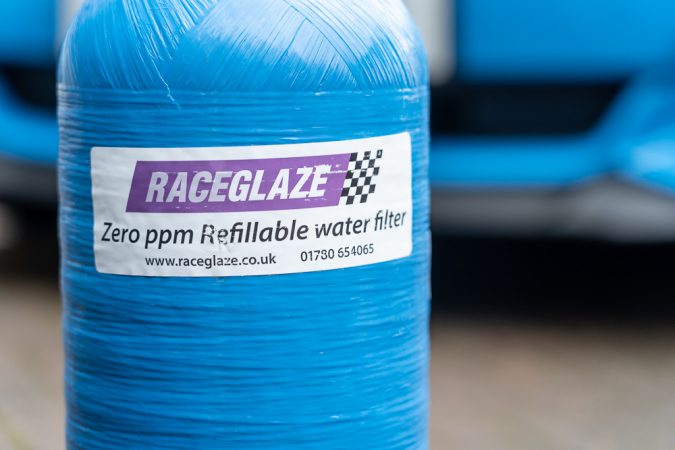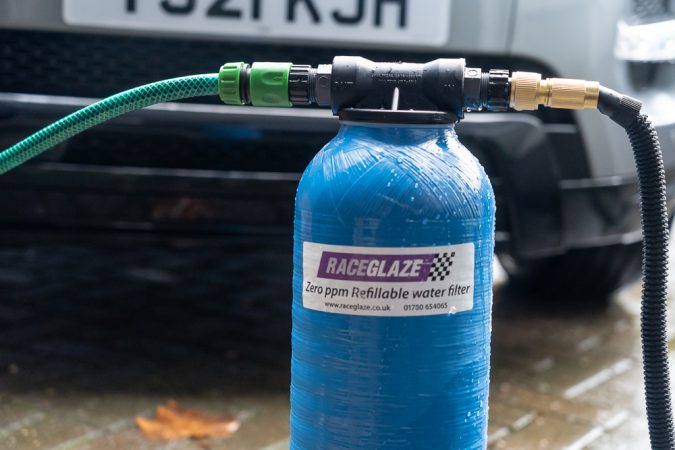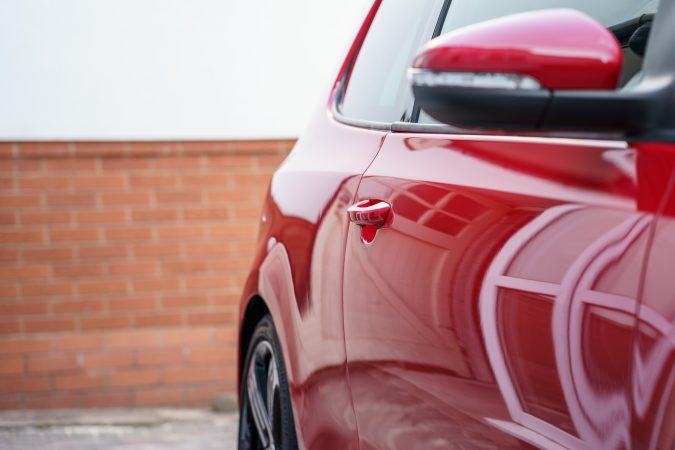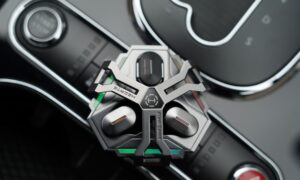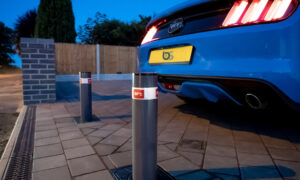Car care can be tricky, requiring minute attention to detail and a steely-eyed focus on spotting every last imperfection. The same goes even for cleaning your car. And, it certainly takes a whole lot more than just throwing a bucket of soapy water onto the roof, and start sponging away. No, for the best results, sometimes you need special tools, like Race Glaze’s 0ppm refillable car wash water filter.
The issue’s always been that washing your car will always leave some marks. If you don’t leave your car to dry sufficiently after giving it a wash, then it’ll leave irksome water spots. Still, even if you try hard enough to dry it as thoroughly as you can with a towel, you might still be able to see some swirl marks. Or worse, you may even end up leaving behind scratches, engraved onto the paintwork.
I’d argue that skills and experience could still be outmatched with the right kit on hand. Hence, why I’ve been quite pleased with this odd, blue fire extinguisher thing. Although, and if you’re not used to the intricacies of washing your car, you might look at this in puzzlement. How can a tank, with some filters inside of it, somehow make washing your car easier or better? What magic tricks is it doing?
What Is Race Glaze’s Car Wash Water Filter?
Ah, but first, let’s look at how this car wash water filter operates, starting from the top. On one end, this is where you’ll connect it to the mains, with 3/4″ threads with male Hozelock-type connectors. It then joins to this giant, 7-litre capacity tank. The water comes into the vessel and goes straight down to the bottom through the tube that’s located in the head. Under mains pressure, it then rises through the resin bed the water under pressure and exits via the out pipe.
On the other side, you can connect a hosepipe to rinse off your car. So far, Race Glaze’s car wash water filter sounds quite simple, right? Aha, but what trickery, you might ask, that’s used to magically make the water that comes out of the other end any different from mains water? Its secret lies inside this robust, 11-bar pressure-tested fibreglass tank, where we get to the resin.
In particular, a high-quality Belgian-made MB115 A1-grade resin. This is used to purify water from the mains and leave it crystal clear as it’s sprayed onto your car. As the name might suggest, Race Glaze’s car wash water filter has a 0ppm (parts per million) rating. In other words, this means that it’s been tested to get rid of every little impurity and mineral deposit from the mains water supply. All of them.
How Does This Car Wash Water Filter Work?
Nevertheless, what came out of this water filter is still just water, right? So, how can it prevent water spots from compromising your car’s looks whereas usual mains water requires such diligent care? Ah, that’s because Raze Glaze’s thorough purification system essentially turns mains water into pure and distilled (or deionised) water. And it’s been proven that this sort of clarity of water works well.
In basic terms, mains water contains mineral deposits – such as calcium, magnesium, iron, and more – that stick onto your car’s paintwork after the water’s dried off. This visible, whiteish mark is what we call, water spots. For a spot of context, the UK has an average mains water purity of around 300ppm. However, there are parts of the country that get dirtier water, sometimes upwards of 420ppm.
Race Glaze’s solution – thanks in no small part to the resin – reduces this down to nil. Or, to just about an imperceptible amount. So much so, that many professional and high-end car detailers use similar types of filtration systems that create distilled and purified water. In other words, you can use its car wash water filter, and even allow it to air dry or evaporate naturally, without leaving marks.
Is It Really That Good?
Indeed, it works wonders with our new VW Transporter campervan project. Which, while pretty great in every regard, carries a rich, deep black paintwork that shows off marks like a sore thumb. Oh, and it shows up in the most visible – or annoyingly hard to reach – spots, as well. In practice, giving this a quick rinse with Raze Glaze’s car wash water filter is a great way to give it a sparkling water spot free shine.
Better still, it’s intuitive to use. At just half mains pressure, you can give your car a fine, wavy mist of pure water. For smaller cars, it takes no more than 45 seconds to cover its entire surface area, or just about a minute for larger SUVs and our campervan here. Once that’s done, you don’t have to fiddle about with a towel trying to dry it completely, which is great in the winter and summer for different reasons. Also, the filter and resin themselves are rather long-lasting.
Their lifespan is in the neighbourhood of 450 to 700-litres, depending on how poor the water quality in your local mains might be. But if you’re sparing with its usage, as how we detailed it earlier, and use it as a finishing touch, then it could last for quite a while. Being efficient about water usage will prolong the number of individual washes, and keep the costs down until the filters need changing.
Final Thoughts
With that in mind, the entire car wash water filter unit costs around £99.99. One key USP compared to most other similar products is Race Glaze’s implementation of refillable tanks. A new sack of filter resin, when you need it, will set you back £45. So your ongoing costs more than halve.
We reckon that a last minute rinse will use up around 5 to 7-litres of water for optimal results. In its lifecycle, that 7-litre filter alone could purify water for around 80-100 car washs with distilled water. Once again, it is far more efficient than comparable filter systems. While it’s not something most would have lying around their garage, the Race Glaze refillable 0ppm car wash water filter is nevertheless a fantastic bit of kit.
That’s especially so if you’re enthusiastic about washing your car. Or, are perhaps in the business of washing cars and detailing them to perfection. As a whole, Raze Glaze’s car wash water filter is one step above and beyond the rest of the market. It’s easy to use, costs relatively little to run, doesn’t contribute to significant waste, and best of all, it does exactly what it says on the tin.

